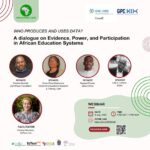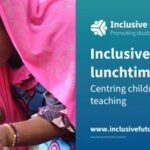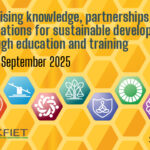Deadline: 15 September 2022, 23:00 (GMT+3)
- Background
The advent of COVID-19 has exacerbated challenges in Africa’s education and training systems and reinforced the need for innovative solutions that are fit for purpose and can be scaled up sustainably to meet the continually evolving context of education and training. Although the education deficit in Africa is large, significant progress has been made over the past decade. About a fifth of children between the ages of 6-11 are out of school, whereas for children between 12-14 exclusion is about 33%; and an estimated 60% of youth between the ages of 15-17 not in school, with girls more negatively affected. Thus, access remains a challenge at different levels.
In this context, Innovating Education in Africa (IEA) was established in 2018 by the African Union (AU) with the aim of identifying, promoting, and supporting the systemic adoption and replication of education innovations in all aspects of education and training in Africa. The IEA program is designed to generate and validate solutions to persistent education and training challenges in Africa and to support the expansion and scale of effective solutions. Since the inception of the program, over 1,500 education stakeholders across Africa have been engaged, and 180 innovations have been promoted and supported with up to 1 million USD.
IEA Call
The AU Innovating Education in Africa Call invites innovators to propose new and practical education innovations with the potential for sustainability, scalability and replication on a wide scale. We are looking to mobilize continental education innovators to rethink solutions that will help address education and skills development challenges in Africa especially as countries emerge from COVID-19.
We aim to create change by:
- Incentivizing innovators to identify major education and skills development challenges in Africa;
- Sourcing innovative ideas and solutions to those challenges for adoption replication and scale-up; and
- Encouraging innovation partnerships involving education and training institutions, governments and other key stakeholders.
- Eligibility Criteria
Applications will be accepted from citizens of AU Member States leading an organisation that meets the following criteria.
- Successfully implementing an education innovation in one or more AU Member States with verifiable outcomes. An education innovation refers to a product or service being offered by an organisation which uses a relatively distinct approach—with respect to the African context—in addressing challenges in the education system.
- Legally registered and licensed to operate in an AU Member State.
- Directly responsible for the implementation and management of the innovation, i.e., not acting as an intermediary.
- Application Procedure
Submissions should be made online in English or French at www.edu-au.org/submit-innovation, with the following information.
- Brief statement of the challenge being addressed (100 words).
- Description of the innovation, specifically how it functions, the implementation approach, and revenue model (500 words).
- Report of the performance and outcomes of the innovation (500 words).
- Documentation of business registration and license of operation.
Please note that no more than one innovation may be submitted by an organisation; failure to comply will lead to disqualification. Recipients of grants under the IEA programme in the past are not eligible to apply.
Deadline for submissions: 15 September 2022 by 23:00 (GMT+3). Enquiries may be sent to owusum@africa-union.org.
- Evaluation and selection process
Submissions will undergo the following process.
|
|
Activity |
Outcome |
Timeline |
|
i. |
Eligibility Check |
The longlist of eligible innovations |
19-21 September 2022 |
|
ii |
Technical review and shortlisting |
50 promising innovations and 10 finalists for Early Pitch are selected. |
22 September – 7 October 2022 |
|
iii |
Early Pitch (Virtual) |
5 finalists for Final Pitch are selected |
13 October 2022 |
|
iv |
Final Pitch (Tunisia) |
3 Innovations are selected and awarded grants |
November 2022 |
- Benefits for successful applicants
Successful applicants will benefit from one or more of the following:
- Receive grants of up to 100,000 USD to strengthen the interoperability of innovations with public education systems, while collecting evidence on effectiveness.
- Promotion of Innovation to AU Member States and Development Partners, including publication in the Africa Education Innovations Handbook 2022.
- Certificate of recognition from the Commissioner of Education, Science, Technology, and Innovation of the African Union.




